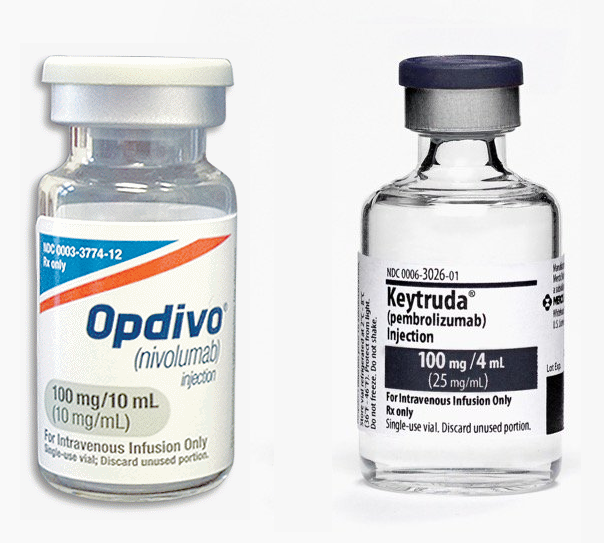
Two blockbuster immunotherapies Opdivo and Keytruda gained insurance coverage last month, setting off the race between Bristol-Myers Squibb Korea-Ono Pharma Korea vs. MSD Korea to market the drug to local physicians.
Bristol-Myers Squibb-Ono Pharma Korea and MSD Korea opened their news conferences on Wednesday and Thursday, respectively, reflecting physicians’ opinions of the drugs as well as their different business strategies.
Clinical practice: what’s different?
Four doctors in the field of immuno-oncology gave their opinions regarding Opdivo (ingredient: nivolumab) and Keytruda (ingredient: pembrolizumab) at each press conference.
“Asking [doctors] whether they like Opdivo or Keytruda is like asking whether you like Coke or Pepsi more,” said Professor Cho Byoung-chul조병철 from Yonsei Cancer Center,연세암병원 while answering a reporter’s question of which drug he preferred, at the Opdivo press conference.

“When it comes down to the selection, it will depend on each doctor’s experience in the field as a physician,” said Professor Ahn Myung-ju안명주 from Samsung Medical Center삼성서울병원. “The differences between the two drugs are that Keytruda is administered once every three weeks and Opdivo once every two weeks along with an hour injection versus a 30-minute injection.”
But the data is all good. It’s hard to say whether one is better than the other, Ahn added, saying, “However, I do believe since Keytruda got approval as the first-line treatment, patients [with a certain level of PD-L1 expression] should go over to it.”
Professor Professors Kang Jin-hyoung강진형 from St. Mary’s Hospital서울성모병원 talked about a striking phenomenon in the clinical field: patients have more say in which medication they get.
“Personally, I have no choice but to use Opdivo in patients with a biomarker expression of 50 to 10 percent, but realistically I often ask the patient what they want,” the professor said. “Around 70 to 80 percent of these patients do their research beforehand and ask me about Opdivo and Keytruda [before I tell them].”
“However, I did notice that Keytruda may be more beneficial for patients from rural areas [to gain treatment in Seoul] since the drug can be administered less frequently,” he added.
At the Keytruda press conference, Professor Kim Bong-seog김봉석 from VHS Medical Center중앙보훈병원 stated prescription would depend on PD-L1 expression.
“Personally, I would prescribe Keytruda if there was a PD-L1 biomarker of more than 50 percent and nivolumab in case of PD-L biomarker between 10 to 50 percent,” Professor Kim said.
“The way I see it, there is no winner-takes-all. The platforms are different. [The pharmaceutical industry] is different from other industries and there will be no one winner – it’s more of a fight over market share,” Professor Kang said. “But right now it looks like 50-50 percent.”
Business strategy: what’s different?
The difference between the two drugs – and the factor that gives one competitive edge over the other – comes down to strategic business decisions translated into different clinical trial designs, ultimately leading to different indications, market watchers said.
■ Related : How do clinical trials affect stocks of pharmaceutical companies?
Bristol-Myers Squibb chose to target a broad patient population and aimed to gain the widest approval for Opdivo. The drug had gained seven indications for the drug domestically, far outflanking Keytruda on the indication front.
■ Related : Opdivo’s expanded indications ease cancer patients’ worries
And the expanded indications have become heralded as a lifesaver for many Korean cancer patients who were in qualms about government policy that limited immunotherapies being prescribed off label.
■ Related : Cancer patients protest government policy limiting off-label use
Merck & Co (known as MSD outside the U.S. and Canada) chose a different strategy, opting to narrow its patient pool based on PD-L1 biomarkers. The precision medicine approach reflected in its clinical trial design which only allowed patients with certain levels of the PD-L1 biomarker, banking on improving efficacy for targeted patients, albeit decreasing the number of indications it could get.
And MSD Korea’s한국MSD clinical trial design has affected the number – and kinds – of indications it got for the drug. Keytruda has not only been priced higher at 2.8 million won ($2,461) per 100mg as opposed to Opdivo’s 1.3 million won ($1,150) per 100mg but also gained approval as the first-line treatment of non-small cell lung cancer.
■ Related : 2 immuno-oncology therapies receive insurance coverage
Keytruda is now effectively challenging chemotherapy by becoming the first-line treatment for cancer in March of this year – a feat achieved solely by MSD.
“Keytruda exemplifies the importance of biomarkers,” said Professor Kim from VHS Medical Center. “The drug has proved [safe and efficient] not only as the second-line treatment for non-small cell lung cancer but also as the first-line treatment. We now hope the drug gains insurance coverage for first-line treatment.”
In the domestic market, this roughly translates into Opdivo having a wider patient population as a second-line treatment for multiple cancers, while Keytruda was gaining front as the first-, and second-line treatment for a relatively smaller pool of patients in one or two cancer types, the market watchers said.

